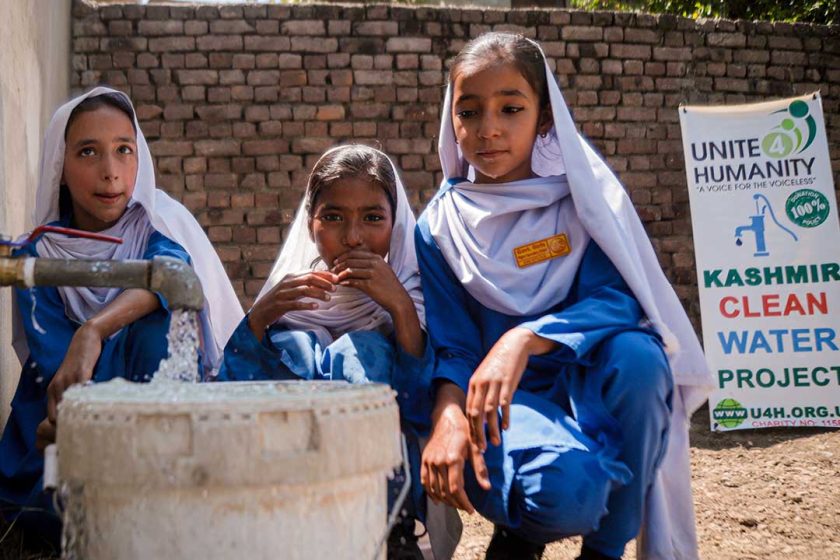Access to clean water is a fundamental human right, yet millions of people around the world, including those in Pakistan and Azad Kashmir, continue to lack this basic necessity. The scarcity of clean water not only poses health risks but also hinders socio-economic development in these regions. Fortunately, individuals and organizations in the UK have the power to make a significant impact by donating to initiatives that aim to provide clean water to communities in need. In this article, we will explore the challenges faced by Pakistan and Azad Kashmir regarding water accessibility, highlight the importance of donating, and discuss how such contributions can transform lives and communities.
The Water Crisis in Pakistan & Azad Kashmir
Pakistan and Azad Kashmir are regions rich in natural resources, yet access to clean water remains a challenge for many of their inhabitants. Factors such as rapid urbanization, population growth, inadequate infrastructure, and environmental degradation exacerbate the water crisis in these areas.
In rural areas, communities often rely on contaminated sources such as rivers, ponds, and wells for their water needs, exposing them to waterborne diseases such as cholera, typhoid, and hepatitis. Furthermore, erratic rainfall patterns and melting glaciers due to climate change threaten the availability of clean water, particularly in mountainous regions like Azad Kashmir.
The Importance of Donations
Donations play a crucial role in addressing the water crisis in Pakistan and Azad Kashmir. They enable organizations to implement sustainable solutions that provide communities with access to clean and safe water sources. By donating, individuals and groups in the UK can contribute to initiatives that:
Build Infrastructure: Donations can fund the construction of water supply systems, including wells, boreholes, and water treatment plants, ensuring that communities have reliable access to clean water.
Promote Hygiene and Sanitation: Education and awareness programs on hygiene and sanitation practices are essential components of water projects. Donations support these efforts, empowering communities to maintain clean water sources and improve health outcomes.
Empower Local Communities: Many water projects prioritize community participation and empowerment. Donations help establish community-based organizations and provide training to local residents, fostering ownership and sustainability.
Address Climate Resilience: Climate-resilient water infrastructure, such as rainwater harvesting systems and water storage facilities, can mitigate the impact of climate change on water availability. Donations support the implementation of these adaptive measures.
Support Research and Innovation: Donations fund research initiatives aimed at developing innovative technologies and solutions for water purification and conservation, ensuring long-term sustainability.
Impact of Donations on Communities
The impact of donations extends far beyond providing access to clean water; it transforms lives and communities in profound ways:
Improved Health: Access to clean water reduces the prevalence of waterborne diseases, leading to improved health outcomes, particularly among children and vulnerable populations.
Enhanced Education: Children, especially girls, are often responsible for fetching water in many communities. With access to clean water nearby, they can attend school regularly, leading to higher enrollment and retention rates.
Economic Empowerment: Reliable access to clean water enables communities to engage in productive activities such as agriculture, livestock rearing, and small-scale enterprises, thereby improving livelihoods and reducing poverty.
Women’s Empowerment: Women are disproportionately affected by the water crisis, as they bear the primary responsibility for water collection and household chores. Access to clean water frees up time for women and girls, empowering them to pursue education, income-generating activities, and community leadership roles.
Environmental Sustainability: Sustainable water management practices promoted through donation-funded initiatives contribute to environmental conservation and resilience, ensuring the long-term well-being of ecosystems and biodiversity.
How to Donate
Numerous organizations and charities in the UK are actively involved in water projects in Pakistan and Azad Kashmir. To make a donation, individuals can:
Research: Explore reputable organizations and charities that focus on water and sanitation projects in Pakistan and Azad Kashmir. Look for transparency, accountability, and a track record of successful interventions.
Donate Online: Many organizations accept online donations through their websites. Donors can choose to make one-time contributions or set up recurring donations to support ongoing projects.
Fundraise: Organize fundraising events or campaigns within your community, workplace, or social network to raise awareness and funds for water projects. Every contribution, no matter how small, makes a difference.
Corporate Giving: Encourage corporate social responsibility (CSR) initiatives within businesses and companies to support water projects through donations, sponsorship, or employee engagement programs.
Conclusion
Access to clean water is a fundamental human right and a prerequisite for sustainable development. By donating to initiatives that provide clean water in Pakistan and Azad Kashmir, individuals and organizations in the UK can positively impact the lives of millions of people, empowering communities, improving health, and fostering socio-economic progress. Together, through collective action and generosity, we can make a lasting difference and ensure a brighter future for generations to come.

